====================
On the Ninth Sunday after Pentecost, August 10, 2014, this sermon was offered to the people of St. Paul’s Episcopal Church, Medina, Ohio, where Fr. Funston is rector.
(The lessons for the day were: 1 Kings 19:9-18; Psalm 85:8-13; Romans 10:5-15; and Matthew 14:22-33. These lessons can be read at The Lectionary Page.)
====================
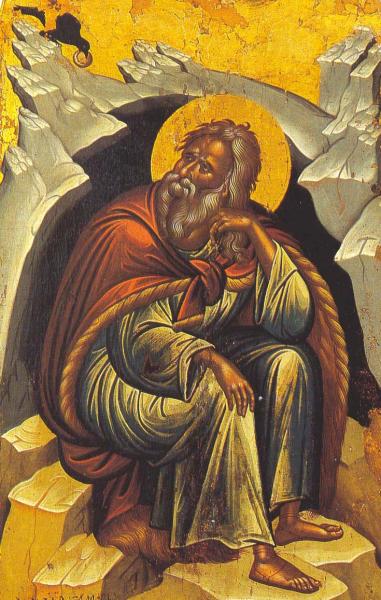 There is a very strong possibility that at least five people in this nave today are suffering from depression. Not just garden variety, feeling a little bit down, depression, but from clinical depression that is being (or should be) treated with medication and therapy. Psychiatrists see more people suffering from depression than people suffering from all other emotional problems combined. It is currently estimated that one in every twenty Americans has been medically diagnosed is currently under treatment for depression. If all of those patients were formed into some sort of organization it would be more than twice the size of the Episcopal Church.
There is a very strong possibility that at least five people in this nave today are suffering from depression. Not just garden variety, feeling a little bit down, depression, but from clinical depression that is being (or should be) treated with medication and therapy. Psychiatrists see more people suffering from depression than people suffering from all other emotional problems combined. It is currently estimated that one in every twenty Americans has been medically diagnosed is currently under treatment for depression. If all of those patients were formed into some sort of organization it would be more than twice the size of the Episcopal Church.
So there’s a very, very good chance that a few of those patients are here today. And it’s a certainty that there is at least one former depression patient in the room: me. I won’t go into the gory details, but about 17 years ago, I had my own bad run-in with clinical depression, but with medication, cognitive therapy, and most importantly spiritual direction, I came through it.
I bring this up because we have two lessons today that directly address the matter of depression and human failure to cope with failure, chaos, and fear. These lessons are instructive not only for those who suffer from clinical depression, but also for those who live and work with them, and for everyone who occasionally suffers from disappointment with life, with frustration and regret. The first is part of the story of Elijah, the Man of God.
Today we have heard a famous and familiar story from the 19th Chapter of the First Book of Kings, the story of Elijah encountering God at the entrance of a cave on Mt. Horeb, which is also called Mt. Sinai, the very place where Moses received the Law from the hand of God. Technically and religiously, what Elijah experiences is called a theophany or epiphany, a manifestation of the divine, but practically what he has received is treatment for depression. Elijah is a classic example of a clinically depressed human being and Yhwh does for him exactly what modern psychiatry has come to understand as the best treatment for depression.
But let’s back up and get the back story on all of this.
This is actually the second theophany Elijah experiences in relatively short order. The first was on another mountain, Mt. Carmel, which is about 280 miles north-northwest of Mt. Horeb. The occasion was Elijah’s battle with the prophets of Baal. You may recall that at the time Ahab was king in Israel, the northern kingdom. Ahab’s queen is a woman named Jezebel who is a princess of Tyre in Phoenicia and a worshiper of Baal. One of Elijah’s prophetic complaints against King Ahab is that he has allowed his queen to establish Baal worship in Israel. As a demonstration of the supremacy of Yhwh, Elijah challenged the 400 prophets of Baal who served Jezebel to a duel. They would each offer a sacrifice on Mt. Carmel and the one whose sacrifice is accepted will be shown to be the prophet of the true god.
The prophets of Baal erected an altar, as did Elijah, and they placed upon it several butchered animals, as Elijah did on his altar. Then the prophets of Baal began to solicit their god; they danced and prayed and sang and prostrated themselves but nothing happened. Then it was Elijah’s turn. Before invoking Yhwh, however, Elijah had the people douse his altar and the offering on it with water, not once but three times. Then, when he called upon the Lord, heavenly fire consumed not only the sacrificed livestock, but the very stones of the altar. This is the first theophany.
As a result, the people repented of their faithlessness, fell on their faces, and worshiped Yhwh. Then Elijah ordered them: “Seize the prophets of Baal; do not let one of them escape.” (1 kg 18:40) Which they did, and they killed all of the prophets of Baal. King Ahab was present during the challenge and witnessed the slaughter of his wife’s religious leadership.
At the beginning of Chapter 19, Ahab rides back to his palace in the city of Jezreel and tells Jezebel what has happened. Her response is to threaten Elijah with death. She sends him a message: “So may the gods do to me, and more also, if I do not make your life like the life of one of [the prophets of Baal] by this time tomorrow.” (v. 2) So he flees the northern kingdom for Mt. Horeb and this is where we are in our reading today.
Elijah experiences the second theophany. He hears the voice of God asking him, “Elijah, what are you doing here?” (v. 9) Elijah’s answer is the that of a severely depressed person! “I have been very zealous for the Lord, the God of hosts; for the Israelites have forsaken your covenant, thrown down your altars, and killed your prophets with the sword. I alone am left, and they are seeking my life, to take it away.” (v. 10)
What do we know about this answer. We know that most of it isn’t true. The Israelites have not forsaken God’s covenant: at Mt. Carmel just a short while before they had repented of any allegiance to the religion of Baal and sworn themselves faithful to Yhwh. They have not killed Yhwh’s prophets with the sword: they have, in fact, killed the prophets of Baal. Elijah is not left alone: there are all those people who swore that oath of repentance at Mt. Carmel, if not many others. They are not all seeking his life: only Jezebel and her followers are doing so.
Elijah, exhibiting classic signs and symptoms of depression, has focused on and exaggerated the negatives in his life, completely ignoring anything and everything positive.
So God decides to get his attention, maybe shake him out of this funk. God sends an earth-shattering wind, then with an earthquake, then with a great fire, but (our scripture insists) God is not in any of those things. Lastly, there is “the sound of sheer silence” and in that deep, deep desert silence Elijah hears a small, still voice . . . the voice of God . . . asking once again, “Elijah, what are you doing here?” (v. 13)
And how does Elijah answer? Almost exactly as he did before: “I have been very zealous for the Lord, the God of hosts; for the Israelites have forsaken your covenant, thrown down your altars, and killed your prophets with the sword. I alone am left, and they are seeking my life, to take it away.” (v. 14) Despite this dramatic theophanic event, in which God has intended to lift Elijah out of his despondency, Elijah’s responses to Yhwh, both before and after the theophany, are nearly identical. His thoughts, words, and actions are those of severely depressed person — withdrawal and escape, moodiness, apprehension and fear, self-pity, feelings of worthlessness, loss of hope and confidence, anger, irritability, wrong headedness, fixation on negative events, and physical exhaustion to name just a few.
And what does God do?
God doesn’t tell him cheer up; God doesn’t tell him to snap out of it; God doesn’t try to reason with him and convince him that all is well. No, God sets Elijah a goal; he gives him a task to perform. Yhwh gets Elijah active and involved once again in his prophetic ministry. “Get up and go do this,” God says, “anoint two new kings in Aram and Israel, and prepare for your retirement by taking Elisha as your apprentice and successor.” (vv. 15-16) This is precisely the sort of specific goal-setting that modern psychology prescribes for the treatment of depression!
Just last year a study published at the University of Liverpool demonstrated that people with clinical depression tend to describe personal goals lacking a specific focus. The lack of specificity makes it more difficult to achieve the goal and this, in turn, creates a downward cycle of negative thoughts. Setting specific goals and realizing them triggers an electro-chemical chain reaction in the brain that makes the patient feel rewarded, and this stimulates happiness, motivation, and self-esteem. (Generalized Goals Linked to Depression)
This is exactly what Yhwh does for Elijah, setting specific goals. What is scientific research has shown to be psychologically true is shown here in scripture to be spiritually true.
The second lesson that I believe directly addresses the issue of depression is the gospel tale of Jesus walking on the stormy waters of the Sea of Galilee.
I must be honest with you; this is one of those Jesus stories with which I am decidedly uncomfortable. I don’t think these stories of Jesus violating the laws of nature are meant to demonstrate Jesus to be some sort of superman or a powerful magician or even to be God. I believe they are, rather, prophetic actions, physical metaphors from which we are to learn something much more important, something about ourselves and about human nature.
Throughout the biblical canon, in other literature of the ancient middle east, and even in our world today, the image of a storm at sea is a powerful metaphor of chaos and even of uncontrollable evil. Twice the gospel writers use it as a way to demonstrate Jesus’ power. First, there is the incident when Jesus is in the boat with the disciples, asleep during a storm. They awaken him and he rebukes the wind and calms the sea. According to Matthew, whose gospel we are exploring in this year of the lectionary cycle, that incident took place earlier. This is the second time the disciples on are on the Galilean lake in bad weather at night, but this time Jesus isn’t with them.
In this story, Jesus is walking on the water and (Mark asserts in his version of the tale – Mk 6:47-51) intends to pass them by. However, they see him, think he is a ghost, and cry out. He identifies himself and reassures them, at which point Peter decides he would like to try this water-walking thing and asks Jesus, “Lord, if it is you, command me to come to you on the water.” (Mt 14:28) Jesus says, “Come” and Peter gets out of the boat and begins to walk on the stormy sea. Note that — Jesus has not quelled the storm. The wind is still blowing; presumably, the water is still choppy, the waves still beating on the boat. Peter successfully takes a few steps, but then is distracted and frightened by the weather and begins to sink. Jesus rescues him; they get in the boat; and that’s when the storm ends and the sea becomes calm.
So what does this say to us about dealing with depression and disappointment?
Let’s say that the stormy sea, the wind, the waves, and all of that are a metaphor for the negativity, chaos, and fear which is clinical depression (and, to a lesser extent, any experience of sadness or grief). And let’s say that Jesus is setting for Peter (and by extension the other disciples) the same sort of goal that Yhwh set for Elijah, a specific, attainable goal, something easily accomplished . . . just walking on the water. We know it can be done; Jesus hass just demonstrated that.
And Peter in fact does accomplish it — he takes a few steps. But then he is distracted; the negative thoughts of depression, the repetitive ruminating over the fear and chaos sets back in. This can and does happen. Recovery from depression is not the quick and easy path the story in First Kings might suggest (and, in fact, even there it isn’t clear that Elijah recovered — he only accomplishes one of the three goals set for him). Recovery from depression takes time; dealing with disappointment, grief, and sadness takes time, and there can be (probably will be) set backs.
The set backs, however, if proper support is given by family, friends, therapists, spiritual directors, and others, don’t prevail. Recovery does happen. Depression can be conquered. The storm of grief can be weathered. The sea can be calmed.
In the epistle today, Paul tells the Romans that the righteousness of faith is not something far away. One doesn’t have ascend to heaven or descend into the abyss to find it. It is, he says, very near; it is, he says, “on your lips and in your heart.” So, too, is the strength that overcomes depression, that gets through regret and grief. Every person has it, has been gifted with it by God. Recognizing that fact takes time and support.
Most clearly in our lesson from Elijah, but also found in our other lessons, the psychological truth demonstrated by modern science are the spiritual truths set out in scripture. “Listen to what the Lord God is saying, for he is speaking peace to his faithful people and to those who turn their hearts to him,” especially those who are struggling with depression or emotional illness, with sadness, frustration, and regret. Let us pray:
Heavenly Father in whom we live and move and have our being: yours is the small still voice of guidance in good times and bad. In your infinite mercy, bring peace and comfort to those who face days sometimes filled with pain and depression. Help us to realize that through you there is joy and the promise of lasting peace. Help us through the rough times and over the stormy seas. Walk before and beside us that we may reach out to you in our journey through life. Help us to focus not on our misfortunes, but on our blessings, through your Son, Jesus Christ our Lord who calms our seas and who is alive and reigns with you and the Holy Spirit, one God, now and forever. Amen.
====================
A request to my readers: I’m trying to build the readership of this blog and I’d very much appreciate your help in doing so. If you find something here that is of value, please share it with others. If you are on Facebook, “like” the posts on your page so others can see them. If you are following me on Twitter, please “retweet” the notices of these meditations. If you have a blog of your own, please include mine in your links (a favor I will gladly reciprocate). Many thanks!
====================
Father Funston is the rector of St. Paul’s Episcopal Church, Medina, Ohio.
 Did Jesus actually say these things? Most contemporary bible scholars would probably answer “No.” The author of John’s Gospel has made Jesus say the things a largely Jewish community of the church in the late 1st Century, a church struggling to cope with its separation from traditional Judaism, believed about Jesus; Jesus is thus both the subject and the interpreter of the message of John’s Gospel. In the 21st Century, we might have preferred the author to have included the interpretation of Jesus in the narrative, not in the words spoken by the character of Jesus portrayed here, but that’s not what we’ve got. What we’ve got is the Jesus remembered by a community with a highly developed Christology telling that community, and us, who Jesus was then and now.
Did Jesus actually say these things? Most contemporary bible scholars would probably answer “No.” The author of John’s Gospel has made Jesus say the things a largely Jewish community of the church in the late 1st Century, a church struggling to cope with its separation from traditional Judaism, believed about Jesus; Jesus is thus both the subject and the interpreter of the message of John’s Gospel. In the 21st Century, we might have preferred the author to have included the interpretation of Jesus in the narrative, not in the words spoken by the character of Jesus portrayed here, but that’s not what we’ve got. What we’ve got is the Jesus remembered by a community with a highly developed Christology telling that community, and us, who Jesus was then and now.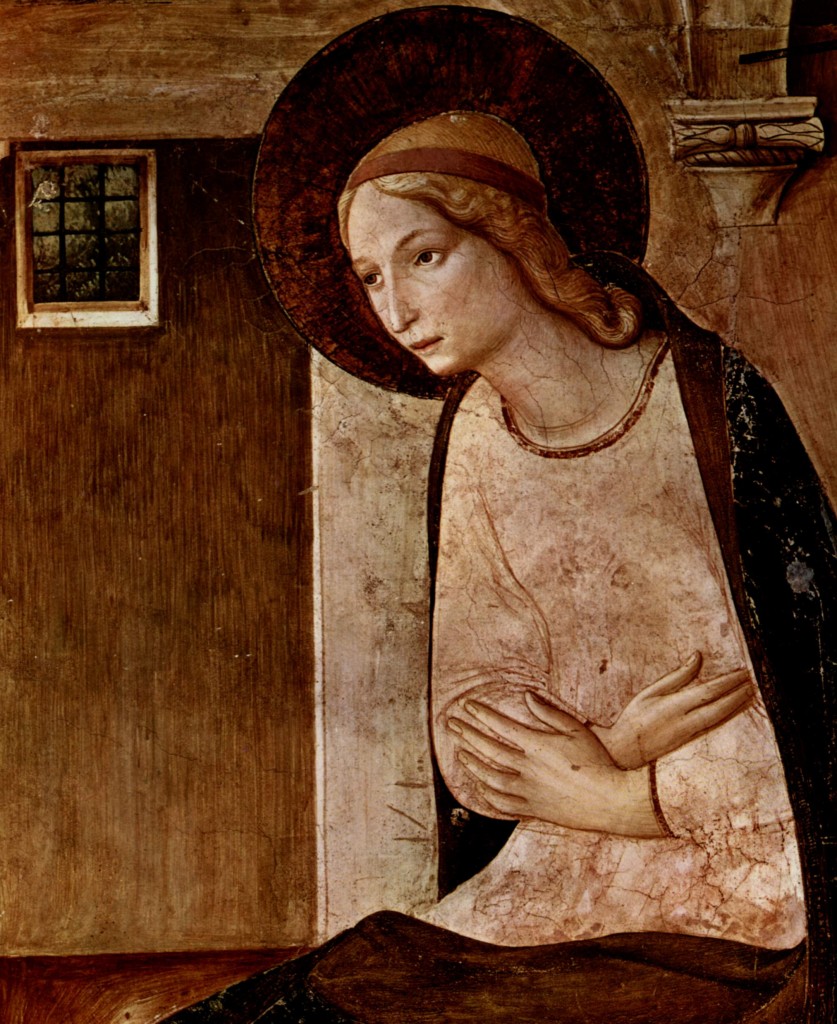
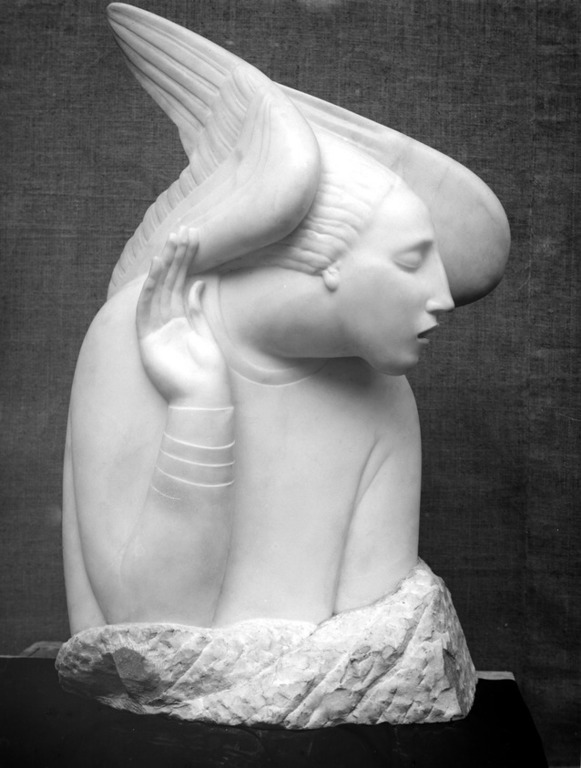
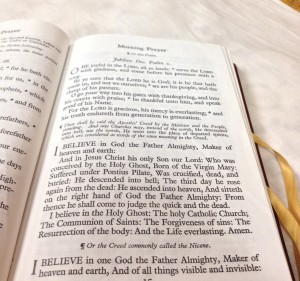 John uses the word “believe” three times in this short passage: once quoting Jesus about witnesses to his acts of power and twice regarding the royal official’s state of mind. What, precisely, does John mean by doing so? That is one of the ponderable but unanswerable questions about scripture, the precise meaning of a biblical author.
John uses the word “believe” three times in this short passage: once quoting Jesus about witnesses to his acts of power and twice regarding the royal official’s state of mind. What, precisely, does John mean by doing so? That is one of the ponderable but unanswerable questions about scripture, the precise meaning of a biblical author.  Shechem was known as Sychar in Jesus’ time. Near that land that Abraham had bought for use as a tomb, just a short walk south from the traditional location of Joseph’s tomb, is a well that belonged to Jacob. At that well, Jesus stopped to ask a Samaritan woman for a drink; part of the story of that meeting and Jesus’ conversation with the woman (the longest of all the conversations recorded in the Gospels) is today’s Gospel text (John 4:27-42).
Shechem was known as Sychar in Jesus’ time. Near that land that Abraham had bought for use as a tomb, just a short walk south from the traditional location of Joseph’s tomb, is a well that belonged to Jacob. At that well, Jesus stopped to ask a Samaritan woman for a drink; part of the story of that meeting and Jesus’ conversation with the woman (the longest of all the conversations recorded in the Gospels) is today’s Gospel text (John 4:27-42).  The second tomb is that of Fr. Justinus, the priest who took over the church from St. Philoumenos and continued his work of restoration. An accomplished artist, Fr. Justinus wrote all of the icons which now decorate the nave, sanctuary, and crypt, including an icon of the martyrdom of St. Philoumenos. Fr. Justinus’s tomb is empty because he is still alive. He built his tomb himself and it is placed just outside the front door of the church; he walks past it everyday coming from his residence in the neighboring monastery to the church. It is a daily reminder of his (and our) mortality and of the dangers he (and many) face in the on-going violence or threat of violence that characterizes the Holy Land today.
The second tomb is that of Fr. Justinus, the priest who took over the church from St. Philoumenos and continued his work of restoration. An accomplished artist, Fr. Justinus wrote all of the icons which now decorate the nave, sanctuary, and crypt, including an icon of the martyrdom of St. Philoumenos. Fr. Justinus’s tomb is empty because he is still alive. He built his tomb himself and it is placed just outside the front door of the church; he walks past it everyday coming from his residence in the neighboring monastery to the church. It is a daily reminder of his (and our) mortality and of the dangers he (and many) face in the on-going violence or threat of violence that characterizes the Holy Land today.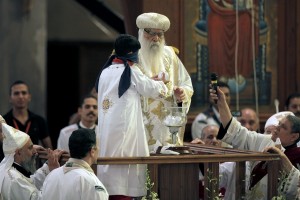

 I wasn’t going to mention this, really, but the mind makes strange associations and when I read the Gospel lesson this morning, particularly this line about the wind blowing where it will and us being unable to tell its origin or its destination, the image that came immediately to mind is an automobile turn signal.
I wasn’t going to mention this, really, but the mind makes strange associations and when I read the Gospel lesson this morning, particularly this line about the wind blowing where it will and us being unable to tell its origin or its destination, the image that came immediately to mind is an automobile turn signal. “In the tragedies in Iraq, Western Africa and Gaza, the waters of chaos are overwhelming us. My personal response right now is to keep my eyes on our Lord. My prayers ascend for all. Save us Lord.”
“In the tragedies in Iraq, Western Africa and Gaza, the waters of chaos are overwhelming us. My personal response right now is to keep my eyes on our Lord. My prayers ascend for all. Save us Lord.” Psalm 91 (along with some verses out of Isaiah) is the basis for Michael Joncas’s 1979 folk hymn On Eagle’s Wings, which (I think) is one of those songs that people either love or hate. I learned recently that a young relative (for whom the 1970s are ancient history) has threatened to haunt anyone who sings it at her funeral. Having officiated at too many requiems where the song was included in the music, I sympathize.
Psalm 91 (along with some verses out of Isaiah) is the basis for Michael Joncas’s 1979 folk hymn On Eagle’s Wings, which (I think) is one of those songs that people either love or hate. I learned recently that a young relative (for whom the 1970s are ancient history) has threatened to haunt anyone who sings it at her funeral. Having officiated at too many requiems where the song was included in the music, I sympathize.

